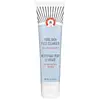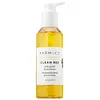What's inside
What's inside
 Key Ingredients
Key Ingredients

 Benefits
Benefits

 Concerns
Concerns

 Ingredients Side-by-side
Ingredients Side-by-side

Water
Skin ConditioningSodium Cocoyl Isethionate
CleansingGlycerin
HumectantStearic Acid
CleansingHydrogenated Coconut Acid
EmollientSodium Isethionate
CleansingStearyl Alcohol
EmollientAllantoin
Skin ConditioningChrysanthemum Parthenium Extract
Skin ConditioningCamellia Sinensis Leaf Extract
AntimicrobialGlycyrrhiza Glabra Root Extract
BleachingAloe Barbadensis Leaf Juice
Skin ConditioningTocopherol
AntioxidantHydrogenated Palm Glycerides Citrate
EmollientPhenoxyethanol
PreservativeDisodium Cocoamphodiacetate
CleansingSodium PCA
HumectantHydroxypropyl Methylcellulose
Emulsion StabilisingCoco-Glucoside
CleansingGlyceryl Oleate
EmollientSodium Chloride
MaskingDisodium EDTA
Citric Acid
BufferingPotassium Sorbate
PreservativeSodium Benzoate
MaskingMaltodextrin
AbsorbentTetrasodium EDTA
Water, Sodium Cocoyl Isethionate, Glycerin, Stearic Acid, Hydrogenated Coconut Acid, Sodium Isethionate, Stearyl Alcohol, Allantoin, Chrysanthemum Parthenium Extract, Camellia Sinensis Leaf Extract, Glycyrrhiza Glabra Root Extract, Aloe Barbadensis Leaf Juice, Tocopherol, Hydrogenated Palm Glycerides Citrate, Phenoxyethanol, Disodium Cocoamphodiacetate, Sodium PCA, Hydroxypropyl Methylcellulose, Coco-Glucoside, Glyceryl Oleate, Sodium Chloride, Disodium EDTA, Citric Acid, Potassium Sorbate, Sodium Benzoate, Maltodextrin, Tetrasodium EDTA
Water
Skin ConditioningSodium Lauroyl Methyl Isethionate
CleansingCocamidopropyl Hydroxysultaine
CleansingChamomilla Recutita Flower Water
MaskingDecyl Glucoside
CleansingMaltooligosyl Glucoside
Skin ConditioningLauryl Glucoside
CleansingGlycerin
HumectantHydrogenated Starch Hydrolysate
HumectantEchinacea Purpurea Root Extract
MoisturisingHoney Extract
HumectantPropolis Extract
Skin ConditioningRoyal Jelly Extract
Skin ConditioningHydrolyzed Sodium Hyaluronate
Skin ConditioningCalendula Officinalis Flower Extract
MaskingGlycyrrhiza Glabra Root Extract
BleachingAloe Barbadensis Leaf Juice
Skin ConditioningMelia Azadirachta Leaf Extract
Skin ConditioningLavandula Angustifolia Oil
MaskingLavandula Hybrida Oil
EmollientCurcumin
AntioxidantCurcuma Longa Root Extract
MaskingBetaine
HumectantSodium PCA
HumectantDisodium Cocoyl Glutamate
CleansingSodium Cocoyl Glutamate
CleansingCitric Acid
BufferingSodium Benzoate
MaskingAbies Sibirica Oil
MaskingCymbopogon Martini Oil
MaskingPelargonium Graveolens Oil
MaskingPogostemon Cablin Leaf Oil
MaskingCaramel
Cosmetic ColorantAnthemis Nobilis Flower Oil
MaskingOcimum Basilicum Flower/Leaf Extract
TonicOcimum Sanctum Leaf Extract
Skin ConditioningMelia Azadirachta Flower Extract
Skin ConditioningCorallina Officinalis Extract
Skin ConditioningAroma
Potassium Sorbate
PreservativeMaltodextrin
AbsorbentTrisodium Ethylenediamine Disuccinate
Sodium Chloride
MaskingSodium Phytate
Propanediol
SolventLinalool
PerfumingWater, Sodium Lauroyl Methyl Isethionate, Cocamidopropyl Hydroxysultaine, Chamomilla Recutita Flower Water, Decyl Glucoside, Maltooligosyl Glucoside, Lauryl Glucoside, Glycerin, Hydrogenated Starch Hydrolysate, Echinacea Purpurea Root Extract, Honey Extract, Propolis Extract, Royal Jelly Extract, Hydrolyzed Sodium Hyaluronate, Calendula Officinalis Flower Extract, Glycyrrhiza Glabra Root Extract, Aloe Barbadensis Leaf Juice, Melia Azadirachta Leaf Extract, Lavandula Angustifolia Oil, Lavandula Hybrida Oil, Curcumin, Curcuma Longa Root Extract, Betaine, Sodium PCA, Disodium Cocoyl Glutamate, Sodium Cocoyl Glutamate, Citric Acid, Sodium Benzoate, Abies Sibirica Oil, Cymbopogon Martini Oil, Pelargonium Graveolens Oil, Pogostemon Cablin Leaf Oil, Caramel, Anthemis Nobilis Flower Oil, Ocimum Basilicum Flower/Leaf Extract, Ocimum Sanctum Leaf Extract, Melia Azadirachta Flower Extract, Corallina Officinalis Extract, Aroma, Potassium Sorbate, Maltodextrin, Trisodium Ethylenediamine Disuccinate, Sodium Chloride, Sodium Phytate, Propanediol, Linalool
 Reviews
Reviews

Ingredients Explained
These ingredients are found in both products.
Ingredients higher up in an ingredient list are typically present in a larger amount.
Aloe Barbadensis Leaf Juice comes from leaves of the aloe plant. Aloe Barbadensis Leaf Juice is best known for helping to soothe sunburns. It is also anti-inflammatory, moisturizing, antiseptic, and can help heal wounds.
Aloe is packed with good stuff including Vitamins A, C, and E. These vitamins are antioxidants, which help fight free-radicals and the damage they may cause. Free-radicals are molecules that may damage your skin cells, such as pollution.
Aloe Barbadensis Leaf Juice also contains sugars. These sugars come in the form of monosaccharides and polysaccharides, folic acid, and choline. These sugars are able to help bind moisture to skin.
It also contains minerals such as calcium, 12 anthraquinones, fatty acids, amino acids, and Vitamin B12.
Learn more about Aloe Barbadensis Leaf JuiceCitric Acid is an alpha hydroxy acid (AHA) naturally found in citrus fruits like oranges, lemons, and limes.
Like other AHAs, citric acid can exfoliate skin by breaking down the bonds that hold dead skin cells together. This helps reveal smoother and brighter skin underneath.
However, this exfoliating effect only happens at high concentrations (20%) which can be hard to find in cosmetic products.
Due to this, citric acid is usually included in small amounts as a pH adjuster. This helps keep products slightly more acidic and compatible with skin's natural pH.
In skincare formulas, citric acid can:
While it can provide some skin benefits, research shows lactic acid and glycolic acid are generally more effective and less irritating exfoliants.
Most citric acid used in skincare today is made by fermenting sugars (usually from molasses). This synthetic version is identical to the natural citrus form but easier to stabilize and use in formulations.
Read more about some other popular AHA's here:
Learn more about Citric AcidGlycerin is already naturally found in your skin. It helps moisturize and protect your skin.
A study from 2016 found glycerin to be more effective as a humectant than AHAs and hyaluronic acid.
As a humectant, it helps the skin stay hydrated by pulling moisture to your skin. The low molecular weight of glycerin allows it to pull moisture into the deeper layers of your skin.
Hydrated skin improves your skin barrier; Your skin barrier helps protect against irritants and bacteria.
Glycerin has also been found to have antimicrobial and antiviral properties. Due to these properties, glycerin is often used in wound and burn treatments.
In cosmetics, glycerin is usually derived from plants such as soybean or palm. However, it can also be sourced from animals, such as tallow or animal fat.
This ingredient is organic, colorless, odorless, and non-toxic.
Glycerin is the name for this ingredient in American English. British English uses Glycerol/Glycerine.
Learn more about GlycerinGlycyrrhiza Glabra Root Extract is an extract of the roots of Licorice. It has been found to have several benefits such as skin hydrating, conditioning, and soothing.
One component, glabridin, has extra potent antioxidant and soothing properties. It has also been found to block pigmentation from UVB rays in guinea pigs.
Licorice Root also contains a flavonoid. Flavonoids are a natural substance from in plants. Flavonoids also have antioxidant properties.
Another component, glycyrrhizin, has been found to have anti-inflammatory and antimicrobial benefits. This may make licorice root extract effective at treating acne. However, more research is needed to support this.
Liquiritin is one of the flavone compounds found in licorice. It has been found to help lighten skin by preventing tyrosinase from reacting with tyrosine. When the two react, protein is converted to melanin. Melanin is the substance in your body that gives your features pigmentation.
Learn more about Glycyrrhiza Glabra Root ExtractMaltodextrin is a polysaccharide. It is derived from starch such as rice, corn, wheat, or potato starch.
In food, Maltodextrin is used to improve the texture and thicken a product. Due to its structure, it can help create a gel texture. As an emulsion stabilizer, it helps keep the ingredients in a product together.
As a polysaccharide, Maltodextrin has moisturizing properties. Polysaccharides are a type of carbohydrate. The top layer of skin uses polysaccharides to retain water, keeping the skin hydrated.
Maltodextrin is water soluble and has a sweet taste.
Learn more about MaltodextrinPotassium Sorbate is a preservative used to prevent yeast and mold in products. It is commonly found in both cosmetic and food products.
This ingredient comes from potassium salt derived from sorbic acid. Sorbic acid is a natural antibiotic and effective against fungus.
Both potassium sorbate and sorbic acid can be found in baked goods, cheeses, dried meats, dried fruit, ice cream, pickles, wine, yogurt, and more.
You'll often find this ingredient used with other preservatives.
Learn more about Potassium SorbateSodium Benzoate is a preservative. It's used in both cosmetic and food products to inhibit the growth of mold and bacteria. It is typically produced synthetically.
Both the US FDA and EU Health Committee have approved the use of sodium benzoate. In the US, levels of 0.1% (of the total product) are allowed.
Sodium benzoate works as a preservative by inhibiting the growth of bacteria inside of cells. It prevents the cell from fermenting a type of sugar using an enzyme called phosphofructokinase.
It is the salt of benzoic acid. Foods containing sodium benzoate include soda, salad dressings, condiments, fruit juices, wines, and snack foods.
Studies for using ascorbic acid and sodium benzoate in cosmetics are lacking, especially in skincare routines with multiple steps.
We always recommend speaking with a professional, such as a dermatologist, if you have any concerns.
Learn more about Sodium BenzoateChances are, you eat sodium chloride every day. Sodium Chloride is also known as table salt.
This ingredient has many purposes in skincare: thickener, emulsifier, and exfoliator.
You'll most likely find this ingredient in cleansers where it is used to create a gel-like texture. As an emulsifier, it also prevents ingredients from separating.
There is much debate on whether this ingredient is comedogenic. The short answer - comedogenic ratings don't tell the whole story. Learn more about comegodenic ratings here.
The concensus about this ingredient causing acne seems to be divided. Research is needed to understand if this ingredient does cause acne.
Scrubs may use salt as the primary exfoliating ingredient.
Learn more about Sodium ChlorideSodium PCA is the sodium salt of pyroglutamic acid. It is naturally occurring in our skin's natural moisturizing factors where it works to maintain hydration.
The PCA stands for pyrrolidone carboxylic acid, a natural amino acid derivative.
This ingredient has skin conditioning, anti-inflammatory, and humectant properties. Humectants help hydrate your skin by drawing moisture from the air. This helps keep your skin moisturized.
Learn more about Sodium PCAWater. It's the most common cosmetic ingredient of all. You'll usually see it at the top of ingredient lists, meaning that it makes up the largest part of the product.
So why is it so popular? Water most often acts as a solvent - this means that it helps dissolve other ingredients into the formulation.
You'll also recognize water as that liquid we all need to stay alive. If you see this, drink a glass of water. Stay hydrated!
Learn more about Water